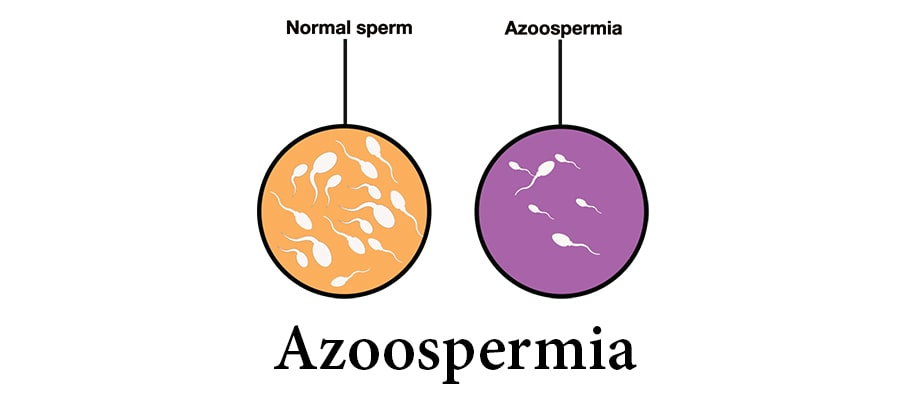What is azoospermia? : How to Low Sperm Count Naturally Treatment
Azoospermia: Low Sperm Count Treatment, Causes, Symptoms and Diagnosis
Azoospermia (Low Sperm Count) means the absence of sperm in semen. When a man ejaculates, he releases millions of sperm. But, a man with Azoospermia does not have sperm in his ejaculate. And infertility is caused by this condition.
Have you ever thought about how common azoospermia is? It is said that about 1% of all men suffer from this condition. And between 10% and 15% of infertile men are diagnosed with this condition. So, men with azoospermia have no sperm count, and that is why their semen cannot impregnate a woman.
Azoospermia is different from ‘low sperm count’ because it is a condition with ‘no Sperm count’. Testicles are like two factories that produce sperm. Contractions in the penis at the time of sex or other sexual activity cause sperm to move. Sperm travels from the testicles through the Vas deferens and reaches the seminal ducts.
Then, it mixes itself with the seminal fluid, sperm and this fluid together is called semen. The semen is ejaculated from the penis. So, first sperm moves. Then, it takes seminal fluid and comes out of the penis.
What are the different types of azoospermia (Low Sperm count)?
There are three types of Azoospermia.
- Pre-testicular azoospermia (non-obstructive). Pre-testicular azoospermia has nothing to do with testicles or any obstruction. It is caused by the abnormal functions of the hormones that produce sperm.
- Testicular azoospermia (non-obstructive). Structural or functional abnormalities of the testicles cause it.
- Post-testicular azoospermia (obstructive). Due to an obstruction of some kind in the reproductive tract, sperm cannot come out of the penis.
What causes azoospermia?
Obstructive azoospermia
As you have read above, azoospermia can be obstructive or non-obstructive. Obstructive azoospermia takes place due to an obstruction in the ejaculatory duct, vas deference or epididymis. It can be caused by the following conditions.
- Injury or infection in the epididymis, ejaculatory duct or vas deference
- Inflammation
- Surgery in the pelvic area
- Cystic fibrosis gene mutation
- Cyst formation
- Vasectomy (a contraceptive procedure)
Non-Obstructive Azoospermia
Non-obstructive azoospermia takes place not because of a blockage but because of other conditions that may involve:
- Hormonal imbalances and endocrine disorders, such as hyperprolactinemia and androgen resistance
- Retrograde ejaculation or other problems related to ejaculation
- Testicular causes may include:
- Testicular torsion
- Cryptorchidism- a condition in which testicles failed to descend into the scrotum
- Anorchia- a condition in which testicles are not present
- Tumors
- Anti-sperm medicines that cause harm to the sperm production
- Radiation treatment
- Diseases, such as diabetes, kidney failure and cirrhosis
- Varicocele- a condition in which veins of the testicles swell up
- Cancers and the treatments
- Spermatogenic arrest- a condition in which testicles produce immature sperm cells
What are the symptoms of azoospermia?
You may be wondering what Azoospermia (Low Sperm Count) symptoms are there to observe. But unfortunately, it is usually asymptomatic. Men usually get to know that they have azoospermia when they fail to impregnate their women for quite a long time of unprotected sex.
If a couple has failed to achieve a pregnancy even after one year of unprotected sex, it is a strong sign of infertility. Either the man or the woman or, in very rare cases, both can be infertile. It is known through a diagnosis which partner is infertile.
Azoospermia causes infertility. But there are signs that signal you may be at the risk of infertility. If you notice these signs, you should not hesitate to consult a doctor.
- Unclear urine after sex
- Small or Undescended testicles
- Ejaculation or erection problems
- Low sexual urge
- Dry orgasm (means little or no orgasm)
- Swollen testicles
- Pelvic pain
- Enlarged breasts
- Delayed puberty
- Decreased hair growth
The above-mentioned points are not the symptoms of azoospermia. But, if you face them, you should talk to a doctor in order to prevent any risk in the future.
How is azoospermia diagnosed?
Azoospermia means no sperm in semen. So, it is diagnosed by testing semen. You may also be asked the following questions by your doctor.
- any injury or surgery in the pelvic area
- exposure to radiation or chemotherapy
- family history with birth defects, reproductive failure and cystic fibrosis
- substance abuse
- any STD infection in the past
- medicines that you took in the past or are taking currently
- illnesses in your childhood
- any fertility success in the past
The following tests may also be done.
- Biopsy on the tissue of the testicles
- X-ray or ultrasound of the reproductive organs
- Testosterone levels and follicle-stimulating hormone (FSH)
- Brain imaging for impairment of hypothalamus and pituitary gland
Is there any natural treatment for azoospermia?
Ayurveda provides zero or low sperm count natural treatment. If you are looking for a natural treatment for azoospermia, Ayurveda can help. It can provide treatment for both, obstructive and non-obstructive azoospermia.
Herbs and panchkarma therapies are effective for treating non-obstructive azoospermia. Panchkarma detoxifies the body, creates balances among various hormones, cleanses the blood and improves the digestive and nervous systems. All these benefits help the body produce sperm and improve the quality of sperm.
For treating obstructive azoospermia, uttar basti therapy is highly effective. In this therapy, the doctor administers medicated oil or ghee into the patient’s genitals through the urethra. This medicated oil then reaches the seminal ducts, vas deferens and the testicles. It repairs the passage of sperm and also works on opening the blockage.
Takeaway
Ayurvedic treatment is also capable of providing other health benefits. Several herbs can improve fertility, sexual stamina and the holistic health of the reproductive organs. Even the treatment of obstructive azoospermia is non-surgical, done with uttar basti therapy.


